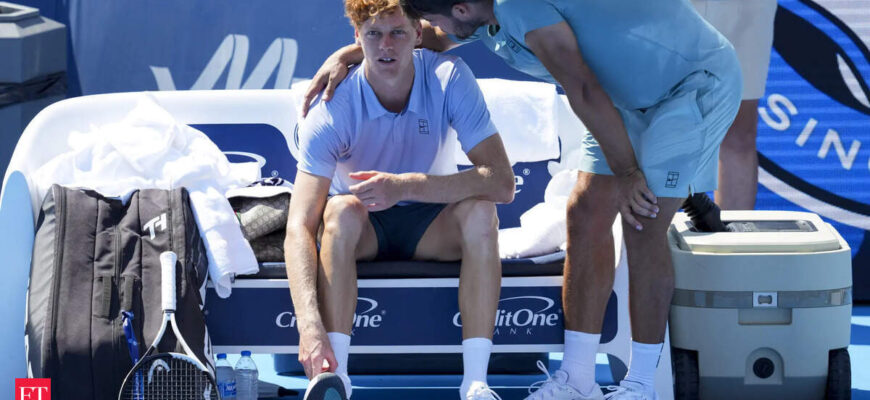The highly anticipated final at the Cincinnati Open, set to be another thrilling chapter in the burgeoning rivalry between Jannik Sinner and Carlos Alcaraz, instead concluded with an unexpected and somber note. After just 23 minutes on court, with Alcaraz leading 5-0 in the first set, Sinner signaled his inability to continue, retiring from the match due to physical distress. While Alcaraz was declared the champion, the circumstances of the win left many spectators with more questions than answers.
The Unraveling Spectacle
From the very first serve, it was evident that something was amiss with Jannik Sinner. His usual explosive power was muted, his precise groundstrokes uncharacteristically astray, and his movement, typically so fluid, appeared heavy and labored. He was visibly struggling to generate pace, his serves lacking their characteristic bite, and his overall court coverage suggested a profound physical discomfort. The body language spoke volumes, painting a clear picture of a competitor operating far below his elite standards.
In a match between two of the world`s best, such a stark contrast in performance is rarely a sign of strategic genius, but rather a harsh indicator of underlying issues. The medical team quickly observed his condition, confirming what many in the stadium already suspected: Sinner was not in a fit state to compete.

The Reasons Behind the Retreat
Post-match, Sinner clarified the situation, stating he had not felt well since the previous day and despite hoping for improvement overnight, his condition had worsened. “I tried,” he expressed with visible regret, adding a heartfelt apology to the fans who had come to witness a grand final, particularly those who had taken time off work on a Monday. This candid explanation offered a stark reminder that even the most finely tuned athletic machines are, at their core, human and susceptible to illness.
Adding to Sinner`s woes were the oppressive climatic conditions. Cincinnati, often a crucible of endurance, served up a particularly brutal dish that day: a scorching 32 degrees Celsius coupled with a stifling 50% humidity. Such environmental factors can turn a challenging match into a torturous ordeal, exacerbating any pre-existing physical vulnerabilities. It was a scenario where pushing through could have led to more severe health consequences.
Sportsmanship in the Face of Disappointment
Carlos Alcaraz, despite being handed the victory under such circumstances, displayed commendable sportsmanship. His immediate concern for his rival was palpable. After Sinner retired, Alcaraz`s simple, heartfelt message inscribed on the camera lens – “Sorry Jannik” – underscored the genuine respect and camaraderie that exists between these two rising stars. It was a gesture that spoke volumes about their relationship, transcending mere competition.

The Unspoken Debate: Fragility vs. Fortitude
The immediate aftermath of such an event invariably sparks a flurry of discussion, often veering into the realm of speculative “armchair diagnoses.” Some voices, perhaps recalling the stoic perseverance of tennis legends, questioned the frequency of Sinner`s withdrawals or perceived physical frailties. The internet, a bastion of instant hot takes, quickly debated whether it was a “strategic withdrawal” or a legitimate health crisis. While cynics pondered the tactical merits of conceding a final to conserve energy for future tournaments, the reality, as Sinner explained, was a straightforward battle with illness. It serves as a reminder that even at the pinnacle of sports, athletes are not immune to the common cold, or in this case, a more debilitating ailment exacerbated by extreme conditions.
Comparisons inevitably arise. While Carlos Alcaraz is often lauded for his seemingly boundless energy and robust physical presence, even the most formidable athletes encounter their limits. Alcaraz himself has had his share of withdrawals or played through injury, demonstrating that the demanding ATP calendar tests everyone, regardless of their perceived invincibility. The notion of an “artificial” or “programmed” player, lacking a “Plan B,” is an intriguing, if somewhat harsh, assessment for a player who, despite some recent struggles, has consistently performed at the highest level and clinched major titles.
From the spectator`s perspective, paying for a coveted final ticket only to witness 23 minutes of play can be deeply disappointing. It highlights a recurring tension in professional tennis: the balance between maximizing player output and ensuring their long-term health and the quality of the “product” for fans. The scheduling of matches in peak heat conditions is a perennial concern, often leading to depleted performances, or worse, forced retirements, ultimately detracting from the spectacle.
Looking Ahead: The Road to the US Open
For Jannik Sinner, the focus immediately shifts to recovery and preparation for the upcoming US Open. This setback in Cincinnati, while disappointing, might paradoxically serve as a crucial period for rest and recalibration ahead of another Grand Slam push. For Carlos Alcaraz, his Cincinnati title, albeit gained under unusual circumstances, solidifies his position at the top and adds another trophy to his growing collection.
The rivalry between Sinner and Alcaraz remains one of the most compelling narratives in modern tennis. Their encounters are typically electrifying, a blend of power, agility, and mental fortitude. While this particular chapter closed prematurely, the anticipation for their next clash, hopefully under healthier circumstances, only intensifies. This incident, therefore, is not merely a footnote in a tournament; it’s a talking point about the human element in a hyper-competitive sport, and the ever-present challenge of balancing ambition with well-being in the relentless grind of the professional tour.







